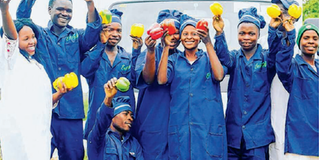Sowing seeds of gold in agribusiness

What you need to know:
- Hadija, a successful agribusiness entrepreneur, says there is a lot of potential in agriculture. And all it takes is doing one’s research first
Planning to venture into agricul-ture? You need to do research first. This is what Hadija Jabir, an entrepreneur in agribusiness advises.
The 27-year-old managing director and co-founder of GBRI Business Solu-tions Limited, says people need to do research and study the market before setting up business. She cites an example of how everyone these days is investing in water melon farming, whose market she says is currently fragile.
Hadija who sells vegetables both local-ly and abroad is so successful that she this year won the 2018 Malkia wa Nguvu award in the Agribusiness category.
The mother of two started with 8 acres in Kiwele village, Iringa Region in 2016 and is now a proud owner of a 40-acre farm in Kiwele and 10 acres in Kilolo, Iringa. She grows cucumbers, brocolli, green beans, avocado, sugar lap and pep-per.
She exports to European countries and has always been assured of reliable market. Hadija has travelled the world, thanks to agriculture, which many peo-ple, especially the youth shun.Know why she is successful? She did her research before embarking on the project and says one mistake most farm-ers make is ignoring the research aspect to the detriment of their ventures.
“Before I started my project I used to visit different farmers to learn how they go about business and to find out the challenges they faced so I would find ways to avoid the risks and uncertainties in the business,” Hadija says.
The business and finance graduate from Saint Augustine University of Tan-zania started business when she was at the university.
“I founded GBRI business solutions when I was in the first year at St Augus-tine University. The aim was to empower the community around me. The compa-ny officially started operations in 2016.”
The thought of venturing into agricul-ture came when Hadija visited a friend in Iringa Region. Seeing the vast erable land in the region, she thought there was money in there and immediately thought of starting a farming project.
Hadija says the eight acres she started with initially seemed big and scaring as she was not sure what tomorrow held. However, two years later she thanked heavens for not having let fear overcome her and she has since never turned back.
Before investing in agriculture Hadija had tried her hands on soap making, a business which unfortunately did not pay off. It was difficult getting a loan to run the project and this made her try agriculture. She believed being one of the basic needs, food would not let her down.
“Demand for food is always high. Peo-ple can live without soap but not without food. In a country with over 50 million people, demand for food must be high. I therefore found it feasible to invest in agriculture in Iringa, which is one of the country’s food basket regions” says the ambitious farmer.
Hadija who is currently in Italy on a business trip does green house and drip irrigation farming. Her local customers include Village Super Market, Seacliff Hotel, Food Azary as well as whole sale customers.She exports consignments to Germany, Ireland and the United Kingdom twice a week, thanks to the inter-net.The internet has helped her a great deal to study the market for her produce and it is through online plat-forms that she gets markets.
Hadija also participates in international agricultural fairs where she showcases her produce. One of the major obstacles she encounters in her busi-ness is the lack of direct flights to the markets. Because of this, she does not sell as profitably as is anticipated. She says connect-ing flights has never been feasible to upcoming businesses.
Lack of air plane services in Iringa is also a challenge. Hadija is forced to transport her produce all the way to Son-gwe Region, which adds more expenses.Another stumbling block is being unable to meet customer demand. Hadija’s company is in the process of using out growers so as to meet the high demand. “Our customers abroad demand 26 tonnes of vegetables a week while we are capable of producing four tonnes only. Plans are on the cards to start buying produce from other farmers.
” Khadija says packaging is another challenge as she is normally forced to import packaging materials from Kenya“Our agriculture policy is also a prob-lem.
We face problems in purchasing raw materials, even setting up cold roooms to store our produce has never been easy. It is also time the taxman regulated the policy to push local businesses,” she notes.According to her, even the interest rate in microfinance institutions needs fixing.
She notes that it is so high that it hardly gives room for small farmers to grow.Hadija calls on graduates to work hard and avoid waiting for white collar jobs, noting that there are lots of opportuni-ties in agriculture. Perseverance and confidence is all they need, she says. She adds that agribusiness is the way to go and that subsistence farming only leads to poverty. She calls on government to put reliable aviation services in place. Email: [email protected]


